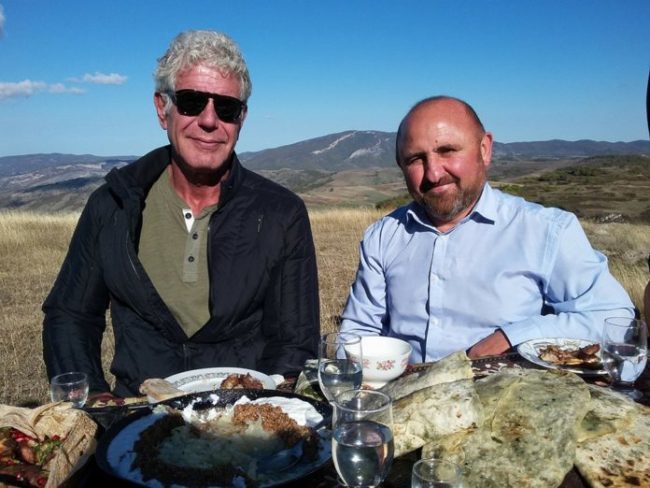

 Azerbaijani authorities are blacklisting Anthony Bourdain, an American chef and CNN host for visiting Nagorno-Karabakh.
Azerbaijani authorities are blacklisting Anthony Bourdain, an American chef and CNN host for visiting Nagorno-Karabakh.
Bourdain visited the region last week to shoot an episode for CNN’s travel and food show ‘Anthony Bourdain: Parts Unknown’, according to Armenian news outlet Massis Post.
Under Azerbaijani law, it’s illegal to cross into Nagorno-Karabakh from Armenia and it’s impossible to do so from Azerbaijan, which considers Nagorno-Karabakh as its legal part.
On 20 October, Bourdain thanked Serj Tankian, an Armenian-American musician, for ‘finally getting’ him to Armenia and ‘making it awesome’.
On 22 October, RIA Novosti quoted spokesperson for Azerbaijan’s Foreign Ministry Hikmat Hajiyev as saying that Bourdain is considered a persona non grata.
Hajiyev responded to Bourdain via Twitter, claiming CNN was about to ‘present ethnically cleansed land of Azerbaijan by Armenia as travel show’, calling it ‘shameful and immoral’.
‘It must be stopped’, Hajiyev added.
Populated mainly by ethnic Armenians, Nagorno-Karabakh is a disputed territory internationally recognised as a part of Azerbaijan, which has not exercised power over most of the region since 1991. The conflict, which dates back to the break-up of the Soviet Union, cost the lives of some 30,000 people and displaced 1 million.
In September, the Azerbaijani Foreign Ministry blacklisted three US lawmakers for visiting Nagorno-Karabakh.
In perhaps the most notorious case, Azerbaijani authorities sentenced blogger Aleksandr Lapshin to three years in prison on 20 July for visiting Nagorno-Karabakh. Lapshin, a citizen of Israel, Russia, and Ukraine, was arrested in the Belarusian capital of Minsk in December after being put on an Interpol wanted list on Azerbaijan’s request. In September, Azerbaijani President Ilham Aliyev signed an order pardoning him.
[Read on oDR: Revenge by red notice: how Azerbaijan targets its critics abroad]
The practice of blacklisting people for visiting disputed territories bypassing their internationally recognised borders is a common practice in the Caucasus. In 2008, Georgia adopted the Law on Occupied Territories, which prohibits entry to Abkhazia and South Ossetia through Russia. According to Georgia’s Interior Ministry, Georgia launched 0 criminal cases using the law in 2008, 88 in 2009, 83 in 2010, 55 in 2011, 26 in 2012, 45 in 2013, 36 in 2014, and 17 in 2015.








